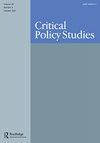Whose ‘truth’ matters? Problematizing the epistemological underpinnings of social policy research
IF 2.4
3区 社会学
Q1 Social Sciences
引用次数: 0
Abstract
ABSTRACTDespite many policies produced to mitigate racism and other forms of discrimination in the public education sector, the inability to implement these policies fall short. These policies may appear to address inequities by attempting to meet legal requirements, however, they do not always address the structural power dynamics grounded in white supremacy which continue to perpetuate systemic racism. Drawing on examples from the Ontario public education sector such as employment equity policies, Afrocentric Alternative Schools in the TDSB and the Student Resource Officer program in Toronto schools, I illustrate how positivist inspired “evidence-based” policy processes fail at offering policy solutions for equity issues by ignoring those who do not fall into the purview of the economic and political interests of dominant stakeholders in the policy process. Deploying an anti-racist and anti-colonial framework, I examine the superficial attempts to garner inclusivity through equity policies that continually fail to heal the wounds of exclusion by reproducing multiple band-aid policies rather than formulating a restructuring of public education in the Ontario public education system that will allow equity seeking groups a place at the table.KEYWORDS: anti-colonialanti-racisteducation policypolicy cyclesocial policysystemic oppression Disclosure StatementNo potential conflict of interest was reported by the author(s).Notes1. The establishment of Afrocentric Alternative Schools in Toronto was a response to the educational needs of the of the Afro-Canadian community, aiming to provide culturally relevant education for Black students. Advocated by community activism, these schools prioritize acknowledging and celebrating the African diaspora’s heritage. They address student engagement, identity affirmation, and academic achievement using Afrocentric pedagogies and curriculum.2. Espinoza (Citation2007) explores the ongoing debates and definitions of how the differences between equity and equality underscore their complexities, particularly when striving to balance excellence and fairness in educational systems and broader social contexts. For the purpose of this paper, I draw on Espinoza’s definitions that 'equality' focuses on uniform distribution without necessarily addressing existing disparities, 'equity' emphasizes fairness and justice by considering individual circumstances and historical disadvantages, aiming to provide everyone with an equal opportunity to succeed.3. In 2007, Julian Falconer, a human rights lawyer, leads a School Community Safety Advisory Panel to examine the increase of violent incidences at schools and to offer the TDSB advice on how to ‘fix’ ‘unsafe’ schools across the Toronto region. Multiple consultations occurred with groups such as parents, professional organizations, administrators, superintendents, trustees, social service providers, the Ontario Human Rights Commission and community groups that were included in the final report. For further discussion about the report see: School Community Safety Advisory Panel (Toronto, Ont.), Falconer, J., Edwards, P., & MacKinnon, L (School Community Safety Advisory Panel et al. Citation2008). The road to health: A final report on school safety. Toronto District School Board.4. The Truth and Reconciliation Commission (TRC) was established in Canada with the goal of addressing the historical injustices and systemic impacts of the residential school system on Indigenous peoples. The TRC’s final report, extensively documented the experiences of survivors, their families, and communities affected by the residential school system. It made comprehensive recommendations to address the legacy of the schools and promote reconciliation between Indigenous and non-Indigenous peoples. The report highlighted urgent need for transformative change in various aspects of Canadian society, including education, to rectify the historical wrongdoings and work towards a more just and equitable future.Additional informationNotes on contributorsMichael Steven FraschettiMichael Steven Fraschetti is currently pursuing a PhD in Policy Studies at Toronto Metropolitan University. Much of his research focuses on the power dynamics regarding issues of race and ethnicity in both the private and public spheres in the Canadian labour market. Understanding Canada as a white settler colonial state, he explores how white dominance operates within the Canadian labour market and highlights its impact on racialized individuals more broadly. By examining racialized individuals’ access to employment, validity of credentials and qualifications, as well as earnings gaps and mobility within places of employment, Michael aims to inform social and public policy that will ultimately aspire to eliminate intersectional inequities in both the public and private spheres of the Canadian labour market.谁的“真相”重要?对社会政策研究的认识论基础提出问题
摘要尽管制定了许多政策来减轻公共教育部门的种族主义和其他形式的歧视,但这些政策的实施能力不足。这些政策似乎通过试图满足法律要求来解决不平等问题,然而,它们并不总是解决以白人至上为基础的结构性权力动态,这种权力动态继续使系统性种族主义永久化。以安大略省公共教育部门的例子为例,如就业公平政策,TDSB中的非洲中心替代学校和多伦多学校的学生资源官计划,我说明了实证主义启发的“循证”政策过程如何忽视那些不属于政策过程中主要利益相关者的经济和政治利益范围的人,从而无法为公平问题提供政策解决方案。运用反种族主义和反殖民主义的框架,我研究了通过公平政策获得包容性的肤浅尝试,这些政策不断地通过复制多个创可贴政策来治愈排斥的伤口,而不是在安大略省公共教育系统中制定公共教育重组,让寻求公平的群体在谈判桌上占据一席之地。关键词:反殖民、反种族主义、教育政策、周期、社会政策、系统性压迫披露声明作者未发现潜在的利益冲突。在多伦多建立以非洲为中心的另类学校是对加拿大黑人社区教育需求的回应,旨在为黑人学生提供与文化相关的教育。在社区活动主义的倡导下,这些学校优先承认和庆祝非洲侨民的遗产。他们使用以非洲为中心的教学方法和课程来解决学生参与、身份肯定和学术成就问题。埃斯皮诺萨(Citation2007)探讨了正在进行的关于公平和平等之间的差异如何强调其复杂性的争论和定义,特别是在努力平衡教育系统和更广泛的社会环境中的卓越和公平时。为了本文的目的,我借鉴了埃斯皮诺萨的定义,即“平等”侧重于统一分配,而不一定解决现有的差距,“公平”通过考虑个人情况和历史劣势来强调公平和正义,旨在为每个人提供平等的成功机会。2007年,人权律师朱利安·法尔科纳(Julian Falconer)领导了一个学校社区安全咨询小组,调查学校暴力事件的增加,并就如何“修复”多伦多地区“不安全”的学校向TDSB提供建议。与家长、专业组织、行政人员、主管、受托人、社会服务提供者、安大略省人权委员会和列入最后报告的社区团体等团体进行了多次协商。关于该报告的进一步讨论见:学校社区安全咨询小组(多伦多,安大略省),Falconer, J., Edwards, P., & MacKinnon, L(学校社区安全咨询小组等)。Citation2008)。健康之路:一份关于学校安全的最终报告。多伦多地区学校董事会。加拿大成立了真相与和解委员会(真相与和解委员会),其目标是解决寄宿学校制度对土著人民的历史不公正和系统性影响。TRC的最终报告广泛记录了受寄宿学校制度影响的幸存者、他们的家人和社区的经历。它就处理学校遗留问题和促进土著人民与非土著人民之间的和解提出了全面建议。该报告强调迫切需要在加拿大社会的各个方面进行变革,包括教育,以纠正历史上的错误,并为更加公正和平等的未来而努力。作者简介michael Steven Fraschetti目前在多伦多城市大学攻读政策研究博士学位。他的大部分研究集中在加拿大劳动力市场的私人和公共领域的种族和民族问题的权力动态。他将加拿大理解为一个白人移民的殖民国家,探讨了白人统治在加拿大劳动力市场中的运作方式,并强调了其对更广泛的种族化个人的影响。通过研究种族化个人的就业机会、证书和资格证书的有效性,以及收入差距和就业场所内的流动性,迈克尔旨在为社会和公共政策提供信息,最终致力于消除加拿大劳动力市场公共和私人领域的交叉不平等。
本文章由计算机程序翻译,如有差异,请以英文原文为准。
求助全文
约1分钟内获得全文
求助全文

 求助内容:
求助内容: 应助结果提醒方式:
应助结果提醒方式:


